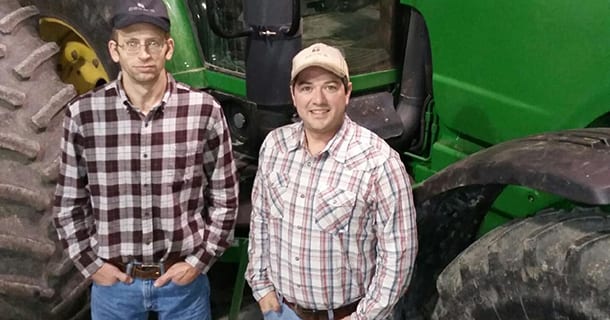
Grand Challenge Winners: Adapt-N

Team Members:
Art DeGaetano, Greg Levow, Jeff Melkonian, Steve Sibulkin, Holly Trytten, Harold van Es
Adapt-N is a highly scalable nitrogen technology solution that offers benefits for farmers, consultants and fertilizer retailers while effectively addressing multiple environmental concerns. The tool reduces inefficiencies in crop nitrogen management by getting farmers to apply the right N fertilizer rate for a particular production environment, while also facilitating the use of other beneficial technologies like better N application timing, cover cropping, optimized irrigation scheduling, and use of enhanced efficiency fertilizer products.
Adapt-N uses software models, real-time weather information, and local soil and crop management factors to daily monitor a field zone’s nitrogen status and derive an optimum nitrogen rate recommendation. It was developed at Cornell University and licensed for commercial use by the start-up company Agronomic Technology Corporation, and has already seen some industry adoption.
The tool is Cloud-based and accessible through any internet-connected device, as well as through other commercial farm data platforms (agX , Agrian and FieldAlytics). It provides transparent and instructive results on simulated nitrogen processes through tabular and graphical outputs which support positive management changes with farmers, like better timing and rates on N application.
Adapt-N has scientifically proven its “win-win” capabilities: higher nutrient use efficiencies and producer profits combined with reduced environmental impacts, as independently acknowledged by the Environmental Defense Fund’s NutrientStar program.
Cropsmith

Team Members:
Tim Smith, Doug Kremer, Jacob Vossenkemper, Ran Williams, Jeffrey Rieck, Ed Graham, Jonathan Norvell, Quentin Rund
There is no single solution to efficient fertilizer use and protecting water quality. A systems approach to sustainable nitrogen management is needed. Team Cropsmith proposes a blend of soil chemistry, microbiology, agronomy, and data analysis to determine the best practices for fertilizer N for efficient corn production.
Their system includes:
- A novel soil test to determine the N supplying power of the soil
- Innovative new products to reduce N loss and enhance biological N fixation
- Agronomic recommendations that adapt to corn production regions and farmer risk management strategies
- Data analytics to help farmers and their consultants customize N applications to fit the particular needs of a field
This approach faces the fact that N management is a complex issue, and a systems approach is the best solution for economic and environmental sustainability.
Pivot Bio

Team Members:
Kevin Hammill, Alvin Tamsir, Karsten Temme, David Guthrie
Pivot Bio is pioneering modern agriculture by unlocking the innate potential of biology. Their microbe-powered technology delivers nutrients, protects crops, and boosts crop quality. The initial focus is to develop a product that fixes atmospheric nitrogen and makes it available to crops such as corn, wheat, and sorghum.
In the Tulane Nitrogen Reduction Grand Challenge, Pivot is utilizing proprietary nitrogen fixing microbes in a breakthrough way to “spoon feed” nitrogen to non-legume crops. This approach integrates with current agriculture fertilizer practices helping reduce leaching, runoff and volatilization. Applying their technology into a crop production plan via seed treatment or at planting will help growers increase yield and quality with novel, practical, effective products with significantly improved environmental outcomes.
Pivot Bio was founded in 2011 and is headquartered in Berkeley, CA. The development of their innovative technology has been supported by the Bill and Melinda Gates Foundation, National Science Foundation, DARPA, and private investors.
Stable’N

Team Members:
Bryan Tomm, JR Hubele, John Hubele
Stable’N has a nitrification inhibitor process that utilizes electricity delivered into the soil by a retrofit to existing fertilizer application equipment. This nitrification inhibitor works much like a traditional chemically based nitrification inhibitor, but it can be applied for much less cost per acre on a farm.
By inhibiting the nitrification process, many nitrogen fertilizers will not be converted into a form of nitrogen that can be easily lost from the soil – therefore more of the nitrogen that is applied will be available for the crop to use. This type of protectionary practice can help farmers ensure that their crops will achieve yield goals without wasting or over-applying fertilizers.
Nitrification inhibitors are already a common practice on many farms, and Stable’N’s technology will help make this practice more economical and more regularly adopted.
Taylor 10: Homecoming Highlights
Friday, November 7th - 9th The Taylor Center celebrated a decade of impact! The Taylor…
Changemaker Institute Application Opens for 24-25
Applications are now open for the Changemaker Institute (CI), a semester-long program that supports graduate students…
Changemaker Institute FAQs
Are you considering applying to the Changemaker Institute? See below for some FAQ's about this…
Spring 2024 Mentors for Tulane’s Social Venture Accelerator
The Taylor team is proud to introduce an incredible group of mentors for the 2024…
Changemaker Institute 2024 Impact Report Released
CI Fellows from 2023/2024 school year report high levels of satisfaction with the program, guest…






